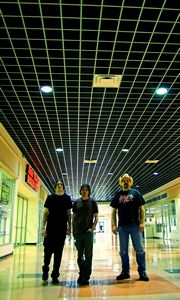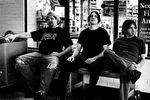social bookmarking tools:
 |
|
| Available RSS Feeds |
|---|
 - Top Picks - Top Picks |
 - Today's Music - Today's Music |
 - Editor's Blog - Editor's Blog
|
 - Articles - Articles
|
Add Louisville Music News' RSS Feed to Your Yahoo!
|
TRUST ISSUES
I once saw a man get stabbed at the Mid City Mall.
Fifteen years later, a song from a Louisville-based band called The Trust would drag me back to a short visit with that memory.
There was a shout, the thwump of a body hitting the hard linoleum, the snap of a plastic grocery bag being flung, the rattle of cans of soda rolling across the floor and hitting a wall.
An old guy in flannel pajama pants and a brown windbreaker was on the floor, one leg being held up by another guy with long gray hair and a beard, wearing a cap and a tattered Army jacket. The bearded one yanked something out of the foot of the guy on the floor, wiped it on his pants legs and strode away quickly. I had just walked out of the bank where I had deposited my paycheck when I heard the sound of the one guy's body smacking against hard, cold tile. The moments of violence you witness brand themselves into your memory. Bar fights, drive-by shootings, hit-and-runs, street brawls: your senses drink it all in and your brain doesn't have time to catch up. Probably why three people can each tell a different story about the same car wreck.
A teenager and I rushed over to the old guy on the floor. He had just come out of the Winn-Dixie that used to be the mall's grocery anchor. Words were probably exchanged with the bearded guy and something had kick-started the fight. We helped him gather his groceries: two frozen dinners and three cans of Chek orange soda, the Winn-Dixie store brand. I steadied him as he stood up. He was big and potbellied, which is why he made the sound of a stack of rubber floormats being dropped from three stories up when he fell. He wore thick square glasses. His thin dark black hair (dyed, probably, because strands of gray showed through) was matted against his head. On his feet was a pair of brown corduroy bedroom slippers. No socks. He smelled like stale, unwashed laundry, as if he'd slept in those same clothes in an uncooled apartment during a heat wave with the windows sealed shut.
He insisted he was all right and waved us away, irritated that we helped him. The teenager handed him his meager bag of groceries. He snatched it away and took a step. I heard a squish. I looked down. Blood leaked from a gash in the instep of his right foot. The rest of the slipper turned dark with it. A thick puddle of red was on the floor where he had stepped.
We had made it outside to the opposite end of the mall, wet, red footprints marking our trail, before the old guy said he felt sick. I sat him down on the curb. The teenager went inside to call 911. The policeman who spoke to us after EMS had hauled the old guy away dismissed what had just happened as a regular event, one more fight among the group of homeless or poor men who would congregate on the benches inside the eastern entrance to the Mid-City Mall, in front of the interior entrance of Winn-Dixie. "Those two were probably best friends yesterday," he had said. "Whenever that guy gets out of the hospital, he and the one who stabbed him will probably be best friends again. Probably even gang up on somebody else."
Fifteen years pass. I sometimes tell that story whenever the context is appropriate, most often whenever someone else has a story of a run-in with one of the Mid-City Regulars. The mall itself was one of the first in the city. Located in the affluent and trendy Highlands neighborhood, it was sometimes a shock for someone who would enter the mall and find a small congregation of tattered, smelly men, something that contributed to the building's nickname Skid-City Mall.
Earlier this year I was listening to a demo of the self-titled debut CD from The Trust. Near the end of the disc, a fuzzed-out blues riff on a slide guitar opens a track called "Mid-City Life." I listen to the lyrics and I'm once again walking alongside a tall, smelly old man, hearing the squish with each step he takes and seeing the smears of blood he leaves behind.
Lead vocalist and guitarist Jon Beazlie sings:
Hey, man, you got a nickel,
Can you spare a dime,
Can I get a cigarette just to pass the time?
I done lost my cardboard box, they just hauled it away,
And my stash of Subway bread that I found the other day.
Some say I'm crazy, I drink Listerine.
Mid-City Life and I ain't got no bitches of my own
To call home.
As a graphic designer for a free publication that has its office in the Mid-City Mall, Beazlie used to encounter those living the Mid-City Life every day.
"This one guy said he was a veteran," Beazlie recalled. "I told him `Tell me a story and I'll give you a dollar.' All he said was, `I got shot here'," Beazlie pointed to a spot on his shoulder, "`I got some lead right here.' And he went on for a while, telling me all his injuries, but no stories. Then I left to go cash my check at the bank, at the L&N Credit Union off Third Street. I saw the same guy in line, wearing a different shirt, cashing a government check. He was probably panhandling for money at the same time, so he was probably making a killing"
The benches inside the mall entrance are now gone. So are the Mid-City Regulars. So is the Winn-Dixie, for that matter. But for anyone who has had a similar experience with one of the regulars, "Mid City Life" would be the song to dredge up the memory.
Which is what a good song is supposed to do: not intentionally cause you to revisit your personal nightmares or unpleasantries (even though that might happen), but to lead you to identify with the point it is making.
But for the members of The Trust, that is something unintentional.
"Pretty much every song's a work in progress," drummer Jeremy Smith said of the band's work. "It's almost hardly ever the same thing every single time we play it."
"Once I get a basic idea of what's going on," Beazlie said, "we'll hash it out."
"He does write all the songs," bassist Joe Wheeler said of Beazlie, "[but] we play off each other, too. When we learn a new song, he'll play guitar part, I might come up with a bass line. There's no sitting down and having a structure and thinking about it"
"Sometimes the lyrics come dead last," Beazlie added. "I don't even know what I'm singing about."
Combined, the members of The Trust have, by their estimate, 45 years of musicianship and songwriting experience. That experience leads to the comfort each band member has of his own and the others' skills. They approach their work like a jazz trio that has been playing on the road for years. Their musical intuition borders on mystical and each song gets played a little differently each time as they develop it.
Seems fitting that they take the same approach to making their music that a veteran jazz trio would, considering that the band's original name, the Herbie Hinkle Ensemble, sounds like a group that would play covers of jazz standards in a swanky hotel lounge.
The Herbie Hinkle Ensemble developed simultaneously as a band and as a myth.
According to the band's web site, Hinkle bought his first guitar after he had earned enough money plowing fields for an onion farmer. Two days later, he lost his left hand in an incident that was so horrendous that Hinkle himself could never again relay it without resorting to language that would make Howard Stern blush. Embittered, Hinkle turned to setting booby traps for joggers in the park, but later discovered a vulnerable, innocent young man whom he could mold and transform, locking him in a basement and forcing him to learn his songs. Once Hinkle was ready to unleash this talent upon the cosmos, he cobbled together a band for the young man, consisting of a wino who slept in a church dumpster and another being Hinkle himself created using the body of a dead sailor, a monkey's brain and a lightning tower.
Thus came the Herbie Hinkle Ensemble.
They performed regularly throughout the town for more than three years. Then Beazlie got the call, the dreaded one that comes after midnight. Herbie had died. According to the family's wishes, the band changed its name briefly to The Hinkle Family Trust. Later, to fit on marquees and to sound less like a foundation loaded with enough money to stuff every mattress in a college dorm, it was shortened to The Trust.
"It's easier," bassist Wheeler said. "Everybody can remember that."
Beazlie agreed. "We got tired of hearing, `the who? the what?' Jazz people would show up for a show, get pissed off and leave. We'd say, `there's some jazz influence in some of these songs. Why do you want to take off?'"
"Seems like we got a little more respect with the name The Trust," drummer Smith said. "Seems like we were almost a bad joke sometimes. The things that would happen to us. We'd be on a bill of six bands and be last and have about 10 minutes to play. Guess we had to pay our dues somehow."
In actuality, the band's origin was a lot less like something ripped off from a story by a bad Stephen King imitator and more from the pages of Forming a Band for Dummies.
"I had graduated from Full Sail recording engineering school in Orlando, Florida," Beazlie said. "I had been acquiring recording equipment and I used to record tracks in the apartment where I was living at the time. Some of the Herbie Hinkle tracks are five years old. I just kept everything and built on it here and there."
"I was in an alt-country band Rural Recovery," Wheeler said. "We broke up."
"I would open up for their band as a solo," Beazlie added.
Wheeler continued. "He had some songs and a friend of ours in the band named Jake had met a guy in Nashville on Compass Records who said he would like to get the music out. Jon said he couldn't because he didn't have a band. So we put together a band, even if it would last for a month, just to get the music out. Then Jeremy came along. Now it's lasted for three years."
"You had a real solid demo," Smith said to Beazlie. "When I heard it before I joined the band, I thought I wanted to be part of this."
Together with keyboardist Bobby Hayes, Beazlie, Wheeler and Smith recorded chunks of the CD in Hayes' basement and Beazlie's and Wheeler's apartments (where the vocals were recorded in a hallway next to the bathroom door, with a wall on one side and a piece of Styrofoam taped to the other) on digital audiotape. Beazlie would then take them over to engineer Nate Robinson's house for engineering and re-mixing.
Robinson was one of the city's most sought-after young recording engineers. He had worked with Travis Meeks and Days of the New at DSL Studios when he was 20, plus he spent a year on tour with Meeks. When he returned, he resumed his engineering work with such local acts as the Java Men, Todd Hildreth, Catch Kennedy and a.m. Sunday.
Sadly, The Trust project would be his last. Ten days after the band's CD release party, Nate Robinson died from injuries suffered in a car accident on Monday, February 6. He was 24 years old.
The members of the band turned sullen when discussing Robinson. "A week after our CD release, our friend's gone," Beazlie said. "Just watching him work, being in his basement for hours on end for three months. We worked as a team. We had plans on going into business together."
Even after Robinson's death, the methods and template he and Beazlie created will be used for future recordings of The Trust.
"That's how we're gonna do the next album," Beazlie said. "Everything's been done our way by ourselves. You can hear a quality in this recording."
"It was recorded in three peoples' houses," Wheeler said. "You can't even tell."
Shortly after the recording was finished, keyboardist Hayes left the band, leaving The Trust as a trio, which apparently isn't a problem for the remaining members.
"It's a little more energetic," said Beazlie. "It's a little louder. I've gotten tighter as a guitar player. Everything we're writing now is based on the three of us. So it's got more of a raw sound."
So is writing songs for a three-person band more of a challenge?
"There might be," Wheeler said, "because it makes the bass do more and it makes the drums add more. You have to fill in. I'll have to do things that another guitar player will have to do."
"You have to be cognizant of that gap," Smith added.
Another gap that the band is attempting to fill is the one between releasing a recording and actually getting ears to listen to it. So far, 300 copies of the debut CD have been sent to radio stations nationwide and, according to the College Music Journal, it has charted on several college radio stations in California, Pennsylvania, Louisiana and Oregon, sharing it with several nationally-known acts.
"It's weird when you see your name in the same list as Rob Zombie or Ben Harper," Beazlie stated. "You're playing the same game. It's just that they've got money and you don't. But we're rolling the dice just like they are."
Thanks to help from several promotional organizations such as Louisville's Crash Avenue, Pilgrim Productions and Tinderbox (which got their CD distributed to the college stations), The Trust may soon have the chance to play outside the city. In the meantime, Beazlie wants the band to revisit a lot of the Herbie Hinkle material.
"We're going to go back and re-cut some of the older Herbie tracks," said Beazlie, "because we want those under The Trust name. We'll do a five- or six-song EP and put that out ourselves again while we're working on the next one. We've got the equipment, we've got the space to do it. It won't take any time at all."
That makes sense for a trio of professionals who have an intuitive read off each others' musicianship, who are clear about the work it takes to make a recording, who have the technical skills to engineer and mix, but who are also easygoing enough that doing all of it seems as natural as walking.
"We don't saturate ourselves with it," Smith explained. "We've got schedules of our own and that, I think, keeps us together. It's like once you end up making somebody your roommate, you end up hating them."
"We don't fight," said Beazlie. "We've known each other for at least 15 years. I don't recall one single instance of a band fight. We just know each other that well."
"Or you can tell if somebody's in a bad mood, you just leave them alone," Wheeler added. "It's `Shut up and play. I don't want to talk about it.'"
The Trust will give you lots to talk about when they play the after party for the Forecastle Festival on July 28 at Headliners Music Hall. For more information on that show and to keep up with other Trust issues, visit www.thetrustmusic.com.



